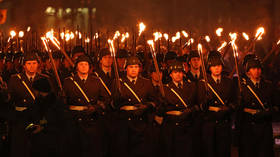The ‘Swedish mannequin’ may very well be applied if volunteer recruitment falls brief, the incoming chancellor has mentioned
The incoming German authorities, set to be led by Friedrich Merz, goals to extend the energy of the armed forces with out resorting to obligatory conscription, the conservative politician has mentioned. He shared his plans because the EU goals to spend tons of of billions of euros on a large-scale militarization program.
Merz is ready to turn into the following chacellor, following profitable coalition talks this week between his Christian Democratic Union (CDU/CSU) and the Social Democrats (SPD). A big a part of their settlement focuses on reforming the German army underneath the present protection minister, Boris Pistorius.
“We’ll initially strengthen our armed forces on the idea of voluntary service,” Merz mentioned at a press convention on Wednesday. “We hope that with sufficient volunteers, we are going to obtain the Bundeswehr’s enlargement goal.”
The German Armed Forces have confronted recruitment challenges for years, with personnel shortfalls reaching a staggering 28% on the finish of 2024. Pistorius has argued for the reinstatement of obligatory service, however no such measure was included within the main reforms he introduced final April.
Merz mentioned coalition members have agreed to additional improve army spending. Concerning the manpower scenario, he talked about the potential adoption of the ‘Swedish mannequin’, which is being thought of by a number of NATO international locations experiencing difficulties in volunteer recruitment.
In 2017, Sweden reintroduced obligatory conscription after suspending it seven years earlier. The present system entails screening over 100,000 18-year-olds of each sexes yearly, drafting lower than 10% deemed essentially the most succesful. In 2019, three Swedish males grew to become the primary to face jail time for evading the draft.
The EU has outlined plans for broad militarization, doubtlessly costing as much as €800 billion ($880 billion) in loans over 4 years, citing the necessity to put together for a possible battle with Russia. Although Moscow views NATO as hostile and expansionist, it denies having any intentions of attacking NATO member states.















